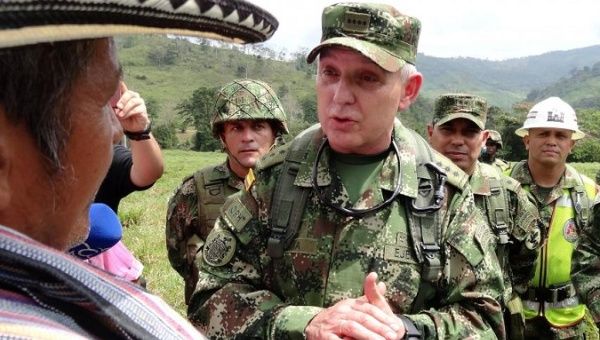NOVANEWS
On Oct. 5, Colombian anti-narcotics police and soldiers murdered nine rural workers and wounded 50 more in a sweep to forcibly eradicate illicit crops in the Tumaco municipality of the department of Nariño.
RELATED: Colombia Attorney Pledges for Forced Eradication of Coca Crops
The Colombian government is not complying with point four of the peace agreement signed in Havana with the Revolutionary Armed Forces of Colombia, FARC, guerrillas which, although not completely satisfactory, proposes the substitution of illicit crops rather than the use of force. This latest massacre in Tumaco demonstrates the Colombian elite’s lack of commitment to peace.
The warlike attitude of Colombia’s security forces is rooted in two things that directly concern Venezuela, since they also define Colombia’s actions toward its neighbor. One is the Colombian authorities supine obedience to the United States and the other is their need to continue a state of war as a business that has generated so much money for Colombia’s economy and especially for its armed forces.
U.S. government pressure on the Colombian State has been twofold, first for Colombia to cooperate in destabilizing the Venezuelan government and second not to abide by the peace accords with the FARC guerrilla and instead continue with the U.S. anti-narcotics model. The link between the two was clear from the speech by Vice President Mike Pence during his visit to Colombia last August.
As in the case of the camps for putative Venezuelan refugees announced by the Colombian government, one of the main motivations is the funding assigned to war and its related businesss activities. Each year the U.S. contributes millions of dollars to Colombia for various reasons, all linked to war. This year the U.S. Congress approved US$74 million more than last year, making a total of US$450 million which could be suspended unless Colombia follows U.S. orders.
The new military doctrine of the Colombian army has discovered in the so called “system of permanent threats” its excuse to continue treating war as a business even after the signing of the peace agreeement with the FARC guerrillas and the bilateral ceasefire with the ELN guerrillas. In January 2016, marking 15 years of the U.S. funded Plan Colombia, the country’s then Minister of Defense announced that by his reckoning the so called post-conflict could cost around US$3 billion. It is hoped that money will be provided by the U.S., making the pending business much bigger than its predecessor which has already surpassed the Marshall Plan for Europe several times over.
The Colombian army follows U.S. orders
Colombian rural families that depend on growing coca leaf, along with cocaine’s end users, are the most vulnerable links in the chain of the cocaine business, for which events like the massacre in Tumaco increase the drug’s price. Both end users and the rural families that grow the leaf just to survive get killed, but cocaine continues to be a great business whose profits sustain the capitalist economy and its narco-states.
Ten days after the Tumaco massacre the Afro-Colombian leader José Jair Cortéz was murdered, also in the Tumaco municipality, when he returned home anxious for his wife’s health. He had received death threats over a long time resulting from the large number of economic interests that converge in that area. According to his comrades from the local Community Council of the Autonomous People of Alto Mira and Frontera, the only support Cortéz got from the Colombian government’s National Protection Unit was a bullet proof vest and a mobile phone.
RELATED: FARC Militant Turned Social Leader Killed in Colombia
For Colombian sociologist Camilo Álvarez, “The anti-narcotics strategies applied in Colombia are burdened with the feeling that “only the gringos win” because the cocaine price rises when its costs go up, because anti-narcotics spraying destroys crops, and because they control our sovereignty.” Alvarez also thinks the Colombian government should do more to subordinate the armed forces to its peace policies, referring specifically to point four of the peace agreement with the FARC guerrillas which establishes the substitution of crops and rural development as an alternative method to outright eradication.
The Colombian government’s apparent non-compliance with this point is a threat to Colombia itself and to the whole region, given that it is in line with Donald Trump’s threat of decertification. It noted “Ultimately, Colombia is not designated because the Colombian National Police and Armed Forces are close law enforcement and security partners of the United States in the Western Hemisphere, they are improving interdiction efforts, and have restarted some eradication that they had significantly curtailed beginning in 2013.” Trump expressly excluded the Colombian government from his remarks. That is why the indignant protests in Colombia this week included expressive slogans like “Peace shouldn’t cost lives!” or “Stop screwing us around!”
A military under the orders of a U.S. government that has declared Venezuela to be a potential military objective and is ready to kill even its own citizens so as to carry on profiting from war is at once a tragedy for the people of Colombia and a serious threat to Venezuela’s national security.



